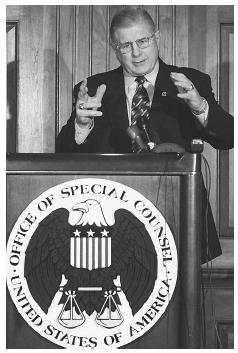Special Counsel and Security Related "Whistleblower" Protection Issues, United States Office
█ JUDSON KNIGHT
In 1989, the United States Congress passed the Whistleblower Protection Act, which provided protections for federal employees who reported wrongdoing, including theft and fraud, in the workplace. Since that time, several high-profile cases have involved personnel claiming protection through the Office of Special Counsel (OSC), established by that Act. Several federal intelligence agencies, however, are exempt from the whistleblower statute. As a result of reorganizations in airport security following the September 2001, terrorist attacks, whistleblower protections also do not extend to some airport personnel.
Whistleblower provisions. Acts of malfeasance reported to the OSC Disclosure Unit (DU) fall into five general categories: violations of laws, rules, or regulations; gross mismanagement; waste of funds; abuse of authority; and specific danger to public health and safety. The

Whistleblower Protection Act (5 U.S.C. 1213) put in place a system unique among existing governmental whistle-blower measures. Provisions of the Act protected the confidentiality of the whistleblower, gave the OSC authority to direct an agency head to investigate charges, and compelled the OSC to provide reports on all whistle-blower investigations to the president and the appropriate congressional committees.
The statute had several caveats, however. Among these was a provision whereby, if the Special Counsel determined that it was necessary to do so, the identity of the whistleblower could be disclosed without his or her consent. Additionally, the law exempted the Federal Bureau of Investigation (FBI), Central Intelligence Agency, and National Security Agency from whistleblower investigations.
The whistleblower statute in practice. A law accompanying the whistleblower statute required the president to establish a separate system to protect FBI whistleblowers, and after a lawsuit filed by the FBI's Frederic Whitehurst in April 1997, President William J. Clinton instructed Attorney General Janet Reno to create such a system. Eighteen months later, no such system was in place, prompting a lawsuit against the federal government by several FBI employees. Among these was Cheryl Whitehurst, who claimed that she had been the target of harassment due to the whistleblowing report of her husband, a respected explosives residue analyst who charged wrongdoing at the laboratory where he worked.
Other notable whistleblower cases have involved Immigration and Naturalization Service official Neil Jacobs in 1998, Centers for Disease Control branch chief William C. Reeves in 1999, and Army Corps of Engineers economist Donald C. Sweeney II in 2000. In contrast to these federal employees, whose whistleblower rights were never in question, federal airport baggage screeners are not covered by the whistleblower statute.
After consultation with the OSC, the newly created Transportation Security Administration (TSA) determined that a whistleblower action could shut down security operations at an airport, creating an unacceptable situation for an already overtaxed air transportation infrastructure. The law creating the TSA, passed by Congress in November 2001, had given its director broad authority for hiring and firing, and in February 2002, TSA chief John W. Magaw elected to use this power to exempt a portion of his agency from the whistleblower statute.
█ FURTHER READING:
PERIODICALS:
Barr, Stephen. "Probe's Findings Support INS Whistleblower." Washington Post. (December 16, 1998): A29.
Grunwald, Michael. "Former FBI Workers File Whistleblower Suit." Washington Post. (October 20, 1998): A17.
——. "Agency Says Engineers Likely Broke Rules." Washington Post. (February 29, 2000): A4.
Schneider, Greg. "No Whistleblowing Protections for Airport Baggage Screeners." Washington Post. (February 8, 2002): A29.
Stephens, Joe, and Valerie Strauss. "Retaliation Alleged at CDC; Scientist Disclosed Diversion of Funds." Washington Post. (August 6, 1999): A19.
ELECTRONIC:
Whistleblower Disclosures. U.S. Office of Special Counsel. < http://www.osc.gov/wbdisc.htm > (April 2, 2003).
SEE ALSO
Airline Security
Civil Aviation Security, United States
FBI (United States Federal Bureau of Investigation)
Intelligence, United States Congressional Oversight
President of the United States (Executive Command and control of
Intelligence Agencies)
Comment about this article, ask questions, or add new information about this topic: